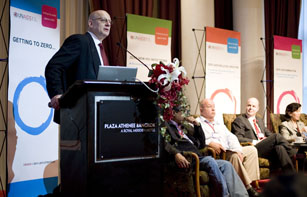
Steve Kraus, Director, UNAIDS Regional Support Team for Aisa and the Pacific, gives an overview on the epidemic and response in the region. Credit: UNAIDS / V. Dithajohn
Nearly 30 countries from Asia and the Pacific have unanimously committed to driving forward the region’s efforts to reach universal access to HIV services by 2015.
This commitment came as more than 250 representatives from government, civil society, people living with HIV, UN agencies and development partners from across the region met in Bangkok, Thailand from 30-31 March, to review progress made and to develop key actions to achieve universal access to HIV prevention, treatment, care an support.
Through a Resolution, unanimously adopted at the end of the review, participants underlined the need for an HIV prevention revolution focusing on key populations at higher risk. Also, the need to sustain gains made in the provision of HIV treatment and to take urgent action to address legal barriers, stigma and discrimination and funding gaps that block progress in the region’s response to AIDS. The Resolution will now be presented to the 67th Commission of the UN Economic and Social Commission in Asia and the Pacific where it will be considered for official adoption by the entire Commission comprising 62 Member governments.
“This is a region showing it is serious about an effective Asia Pacific response to AIDS, and is willing to stand up for sex workers, people who use drugs, men who have sex with men, transgender persons and policies that uphold the human rights of people living with HIV,” said Mr Steve Kraus, Director of the UNAIDS Regional Support Team for Asia and the Pacific. “Commitment and energy have produced a strong and clear agreement on how to achieve universal access in Asia Pacific, giving a strong regional voice in the lead up to the UN High Level Meeting in New York in June,” he added.
This is a region showing it is serious about an effective Asia Pacific response to AIDS, and is willing to stand up for sex workers, people who use drugs, men who have sex with men, transgender persons and policies that uphold the human rights of people living with HIV
Steve Kraus, Director, UNAIDS Regional Support Team for Asia and the Pacific.
Over the two-day meeting, hosted by UNAIDS in collaboration with the UN Economic and Social Commission in Asia and the Pacific, participants noted important progress in the region to date, including that HIV epidemics have significantly slowed or stabilized across the region and that a number of the countries are reaching high levels of coverage for antiretroviral treatment.
However, critical challenges were raised as no country in the region is reaching universal access to HIV prevention, treatment, care and support. One in three people in the region do not have access to HIV treatment; 60% of people living with HIV in the region do not know their HIV status; and key affected communities continue to be subjected to stigma and discrimination, punitive laws, policies and practices which obstruct access to HIV services. Many countries in the region—including those with or approaching middle-income status—rely heavily on international funding for their AIDS responses.
Speaking at the opening, Dr Siriwat Tiptaradol, Deputy Permanent Secretary from the Ministry of Health in Thailand urged countries to make health is a policy priority and to ensure a partnership response: “Progress on universal access can only be possible when different arms of the same government, together with civil society, join together with common goals.We must find ways to support each other, particularly at the regional level, to make AIDS funding a collective responsibility.”

Igor Mocorro, a member of ‘Youth Lead’, addresses the plenary at the Asia Pacific Regional Consultation on Universal Access. Credit: UNAIDS / V. Dithajohn
In times of fiscal austerity and competing development priorities, the need to sustain momentum on HIV was echoed throughout the Consultation. “The world’s most populous region cannot afford complacency on AIDS. Political leadership with civil society and the key affected communities as the cornerstone of the response requires fresh perspectives from the ground,” said ESCAP Social Development Division Director, Nanda Krairiksh.
Strongly emphasized was the critical importance of continued engagement and motivation of the region’s youth—particularly those from key populations at higher risk. Young leaders underlined the importance of the full involvement of young people in the HIV response and urged national leaders and partners to ensure their voices are equally heard and heeded.
“We have the passion for change and it’s time for leaders to take young people seriously as equal partners and key actors in society,” said Igor Mocorro, a member of ‘Youth Lead’, a programme to develop youth AIDS leaders from key affected populations. “We know the realities; we can make a difference.”





